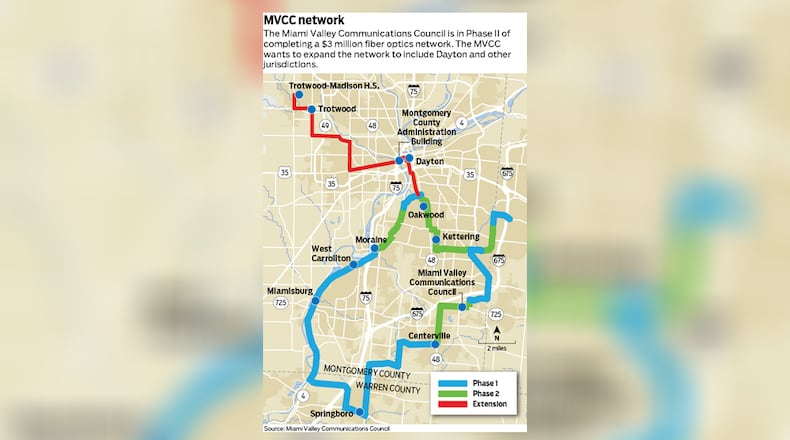Working the Miami Valley Educational Computer Association in Yellow Springs, MVCC members are already connected to the GATEway Public Fiber Network, a $3 million project that is being expanded to what will be a 44-mile ring, officials said.
Credit: FILE
Credit: FILE
Those connected in a 17-mile loop include Centerville, Kettering, Miamisburg, Moraine, Oakwood, Springboro and West Carrollton – as well as Sinclair’s Centerville campus, a non-member, Weiskircher said.
The goal is to increase the network’s capabilities to “provide internet service at a much cheaper rate than what’s available on the regular market” to homes and businesses in participating areas through a recently announced public/private partnership, Weiskircher said.
Connecting to the MVCC network is an issue Dayton is “actively investigating,” according to Jon Rike, the city’s chief information officer.
But Rike said it would be “premature” to comment further at this time. Likewise, Montgomery County “has not committed to this project,” its Communications Director Deb Decker said.
Bridging the digital divide
The MVCC is also “very close to a deal” with Trotwood and its school district, Weiskircher said.
Trotwood “is working aggressively to connect as soon as possible,” Deputy City Manager Stephanie Kellum said in an email.
“This will provide more reliable and cost-effective internet service for the city,” she said.
“It will also create the foundation Trotwood businesses/residents may use to access more reliable internet services” and “will be a way to spur economic development and bridge the digital divide students experience,” Kellum added.
“Our students need internet service with a higher performance capacity without encountering disruption.”
The MVCC hopes to start the Trotwood connection later this summer and complete within eight months, Weiskircher said.
Those on the ring or considering joining are seeking two main benefits, he said: reducing or eliminating the cost of telecommunication services, and attracting new telecommunication carriers in order to provide competition or service to underserved areas.
“In every case, when an additional jurisdiction connects up to the regional fiber network, the geographical reach and additional partnerships increase the value of being part of the network for all connected jurisdictions,” Weiskircher said.
Public/private deal
The MVCC recently announced a deal with Independents Fiber Network. The agreement calls for the Ohio-based business to fully fund the $1.8 million Phase II of the network.
That work involves replacing existing limited capacity fiber with the same “robust new” fiber and conduit installed in the first phase completed last year, according to the MVCC.
The MVCC and IFN will equally split the 288 fiber strands, which can then be sold or leased to interested technology providers, Weiskircher said.
The MVCC deal is “one of the first-of-its-kind public/private partnerships that will deliver state-of-the-art technology,” IFN CEO Robert Shema said in the announcement.
The MVCC now has a 10-gigabit data network, records show. The IFN partnership will provide “a revenue share to the municipalities and up to 100 gig internet service to local businesses in participating communities,” Shema added.
A public/private venture in Northeast Ohio involves fiber network builder Lit Communities and the Medina County Port Authority.
The port authority has a 151-mile fiber optic cable network throughout that county. It connects all of its major metropolitan areas with 144 strands of “dark fiber and providing connectivity to the existing fiber network in Cuyahoga and Summit counties,” according to its website.
Fiber to homes
The MVCC is also working on a fiber-to-the-home initiative that is expected to be announced in several weeks, Weiskircher said.
In a separate project, Springboro last year approved plans for construction of its own 23-mile fiber-optic network looping the city.
Springboro City Council voted to contract with the Warren County Port Authority for up to $3.5 million in financing for the project. The port authority will own the network and will lease it back to the city until it pays off the debt.
The fiber portion of the project construction is for city use only, City Manager Chris Pozzuto has said. The conduit portion will be leased or sold to private internet providers to offer their services through their own fiber optic lines to the homes and businesses, Pozzuto has said.
By the numbers
•341,000: Estimated combined population of existing and proposed communities on the Miami Valley Communication Council’s fiber optics network.
•$30,000: Estimated price of a mile of conduit.
•288: Fiber strands shared by the MVCC and the Independents Fiber Network.
•44: Length in miles of the MVCC fiber optics network upon completion.
SOURCES: U.S. Census, Miami Valley Communications Council
About the Author

